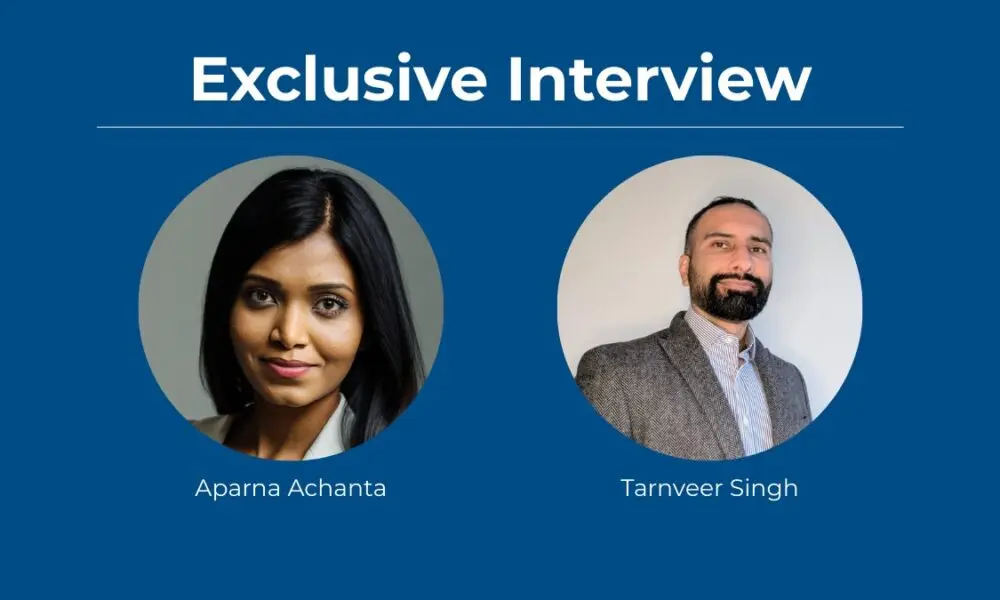Meet the Experts
Aparna Achanta: Architecting Resilient Futures
Aparna Achanta brings more than ten years of experience safeguarding U.S. federal entities, including the FDA and VA. Her expertise encompasses Zero Trust architecture, AI-enhanced security for SaaS and multi-cloud systems, as well as operational cybersecurity strategies. Among her recognitions are the Titan Business Award and a spot on Modern Healthcare’s 40 Under 40 list for 2025.
Aparna is also an accomplished author, contributing insightful articles to platforms like Forbes. Her notable pieces, such as “Embracing AI to Build Resilience Against AI Attacks” and “Securing Low-Code/No-Code Development Platforms,” focus on the intersection of AI security, data protection, and enterprise governance.
Tarnveer Singh FBCS FCIIS: A CISO’s Expertise and Authorial Insight
Tarnveer Singh, an award-winning Chief Information Security Officer (CISO), has two decades of multifaceted experience in security and architecture. Currently serving as CISO at The Exeter insurance and the Director of Security and Compliance at Cyber Wisdom Ltd., he is a thought leader known for integrating ethical, strategic, and psychological aspects into cybersecurity.
His published books, such as Artificial Intelligence and Ethics: A Field Guide for Stakeholders and The Psychology of Cybersecurity: Hacking and the Human Mind, are critically acclaimed for their deep dives into pressing issues from AI risks to digital resilience. Tarnveer is a Fellow of both the British Computer Society and the Chartered Institute of Information Security.
The Interview: Insights into the Landscape of Cybersecurity
Interviewer: Aparna, what initiated your collaboration with Tarnveer?
Aparna: We recognized the fragmentation in cybersecurity knowledge—technical silos that often overlook ethical and strategic dimensions. Our combined expertise can bridge the critical gap between the “how” and the “why” of cybersecurity.
Addressing AI-Driven Threats
Interviewer: What are the urgent AI-driven security threats facing us today, Aparna?
Aparna: Current significant threats include AI-enhanced phishing, deepfakes, and voice cloning, which complicate social engineering attacks. Adversarial threats such as data poisoning and model evasion jeopardize machine learning integrity, whereas vulnerabilities related to generative AI, like prompt injection, continue to emerge.
Organizations and Ethical AI Deployment
Interviewer: Tarnveer, how do ethical challenges in AI relate to daily cybersecurity issues?
Tarnveer: Ethical concerns regarding AI drive inquiries into privacy, fairness, and accountability. AI technologies, inheriting biases through training data, can produce discriminatory security outcomes, affecting both threat detection and response strategies. As AI systems gain autonomy, accountability for their actions—including potential mishaps—becomes increasingly complex, necessitating sturdy AI governance frameworks.
Implementing Effective Security Strategies
Interviewer: Aparna, how does Zero Trust bolster data security in intricate environments?
Aparna: Zero Trust enforces continuous authentication and limits access privileges, micro-segmenting networks to minimize breach repercussions. In multi-cloud and SaaS infrastructures, it facilitates consistent policy application.
Aparna suggests that organizations should focus on robust identity management and data encryption, embedding AI risk management into their security strategies while maintaining comprehensive oversight throughout the AI lifecycle.
Looking Ahead: Future Contributions
Interviewer: What can we anticipate from your upcoming article series, Aparna?
Aparna: Readers can expect in-depth examinations of AI security, cloud governance, and security awareness, combining strategic insights with practical applications. As Tarnveer emphasizes, a collaborative approach will fuel sustainable innovation, reaffirming that cybersecurity transcends technical considerations to become a vital business priority.
Final Thoughts
The collaboration between Aparna Achanta and Tarnveer Singh emerges at a crucial juncture for international cybersecurity. As threats evolve and become more complex, their forthcoming articles promise a necessary combination of actionable insights and forward-thinking strategies aimed at shaping the future of the cybersecurity landscape.



